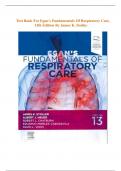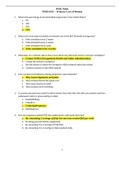Test Bank For Egan's Fundamentals Of Respiratory Care,
13th Edition By James K. Stoller.
, Table Of Contents
I Foundations Of Respiratory Care
Chapter 1: History Of Respiratory Care
Chapter 2: The Profession Of Respiratory Care
Chapter 3: Quality, Patient Safety, And Communication, And Recordkeeping
Chapter 4: Principles Of Infection Prevention And Control
Chapter 5: Ethical And Legal Implications Of Practice
Chapter 6: Physical Principles Of Respiratory Care
Chapter 7: E-Medicine In Respiratory Care
Chapter 8: Fundamentals Of Respiratory Care Research
II Applied Anatomy And Physiology
Chapter 9: The Respiratory System
Chapter 10: The Cardiovascular System
Chapter 11: Ventilation
Chapter 12: Gas Exchange And Transport
Chapter 13: Solutions, Body Fluids, And Electrolytes
Chapter 14: Acid-Base Balance
Chapter 15: Regulation Of Breathing
III Assessment Of Respiratory Disorders
Chapter 16: Bedside Assessment Of The Patient
Chapter 17: Interpreting Clinical And Laboratory Data
Chapter 18: Interpreting The Electrocardiogram
Chapter 19: Analysis And Monitoring Of Gas Exchange
Chapter 20: Pulmonary Function Testing
Chapter 21: Review Of Thoracic Imaging
Chapter 22: Flexible Bronchoscopy And The Respiratory Therapist
Chapter 23: Nutrition Assessment
IV Review Of Cardiopulmonary Disease
Chapter 24: Pulmonary Infections
Chapter 25: Obstructive Lung Disease: Chronic Obstructive Pulmonary Disease (COPD), Asthma, And Related Diseases
Chapter 26: Interstitial Lung Disease
Chapter 27: Pleural Diseases
Chapter 28: Pulmonary Vascular Disease
Chapter 29: Acute Respiratory Distress Syndrome (ARDS)
Chapter 30: Respiratory Management Of Trauma, Obesity, Near Drowning, And Burns
Chapter 31: Heart Failure
Chapter 32: Lung Cancer
Chapter 33: Neuromuscular And Other Diseases Of The Chest Wall
Chapter 34: Disorders Of Sleep
Chapter 35: Neonatal And Pediatric Respiratory Disorders
V Basic Therapeutics
Chapter 36: Airway Pharmacology
Chapter 37: Airway Management
Chapter 38: Emergency Cardiovascular Life Support
Chapter 39: Humidity And Bland Aerosol Therapy
Chapter 40: Aerosol Drug Therapy
Chapter 41: Storage And Delivery Of Medical Gases
Chapter 42: Medical Gas Therapy
Chapter 43: Lung Expansion Therapy
Chapter 44: Airway Clearance Therapy (ACT)
VI Acute And Critical Care
Chapter 45: Respiratory Failure And The Need For Ventilatory Support
Chapter 46: Mechanical Ventilators
,Chapter 47: Physiology Of Ventilatory Support
Chapter 48: Patient-Ventilator Interaction
Chapter 49: Initiating And Adjusting Invasive Ventilatory Support
Chapter 50: Noninvasive Ventilation
Chapter 51: Extracorporeal Life Support (ECLS)
Chapter 52: Monitoring The Patient In The Intensive Care Unit
Chapter 53: Discontinuing Ventilatory Support
Chapter 54: Neonatal And Pediatric Respiratory Care
VII Patient Education And Long-Term Care
Chapter 55: Patient Education And Health Promotion
Chapter 56: Cardiopulmonary Rehabilitation
Chapter 57: Respiratory Care In Alternative Settings
Chapter 58: Ethics And End-Of-Life Care
, Chapter 01 - History Of Respiratory Care
Kacmarek Et Al.: Egan’s Fundamentals Of Respiratory Care, 13th Edition
MULTIPLE CHOICE
Which Of The Following Is An Expected Role Of A Respiratory Therapist?
Promoting Lung Health And
WellnessProviding Patient
Education
Assessing The Patient’s Cardiopulmonary Health Status
Selling Oxygen (O2) Therapy Devices To Patients
1 Only
1 And 4 Only
1, 2, And 3 Only
D. 1, 2, 3, And 4
RIGHT CHOICE- C
Respiratory Care Includes The Assessment, Treatment, Management, Control, Diagnostic
Evaluation, Education, And Care Of Patients With Deficiencies And Abnormalities Of The
Cardiopulmonary System. Respiratory Care Is Increasingly Involved In The Prevention Of
Respiratory Disease, The Management Of Patients With Chronic Disease, And Promotion Of
HealthAnd Wellness.
DIF: Recall REF: P. 3 OBJ: 1
Where Are The Majority Of Respiratory Therapists Employed?
Skilled Nursing Facilities
Diagnostic Laboratories
Hospitals Or Acute Care
SettingsOutpatient Physician
Offices
RIGHT CHOICE- C
Approximately 75% Of All Respiratory Therapists Work In Hospitals Or Other Acute Care Settings.
DIF: Recall REF: P. 3 OBJ: 1
Who Is Considered To Be The “Father Of Medicine”?
Hippocrates
Galen
Erasistratus
Aristotle
RIGHT CHOICE- A
The Foundation Of Modern Western Medicine Was Laid In Ancient Greece With The
DevelopmentOf The Hippocratic Corpus. This Collection Of Ancient Medical Writings Is
Attributed To The “Father Of Medicine,” Hippocrates, A Greek Physician Who Lived
During The Fifth And Fourth Centuries BC.
DIF: Recall REF: Pp. 3-4 OBJ: 2
[Type Here]





